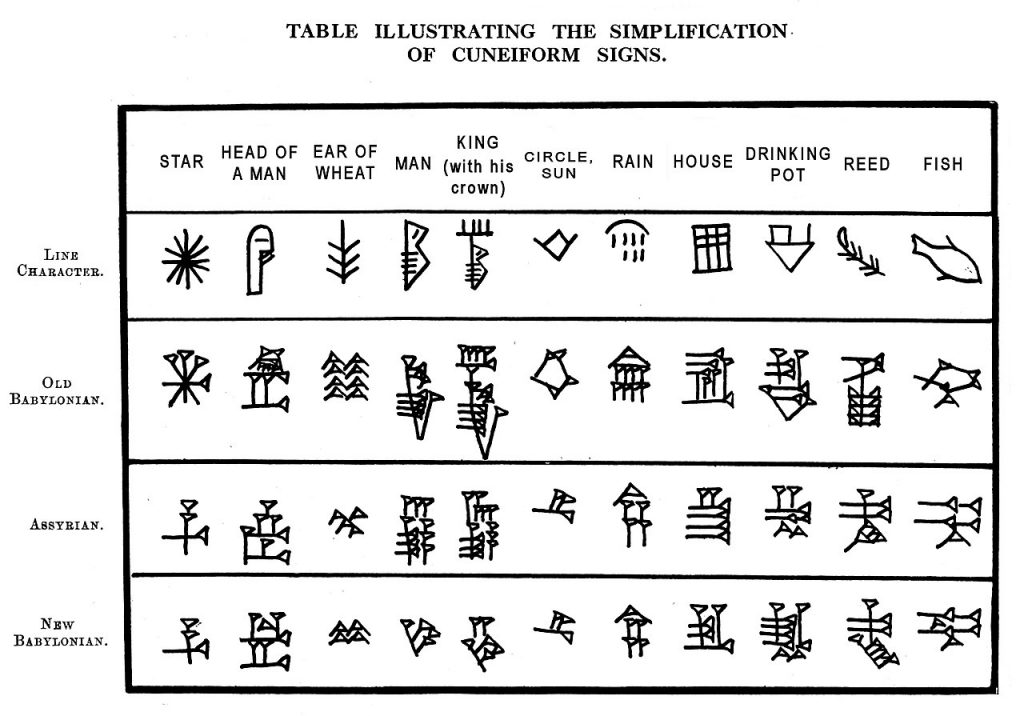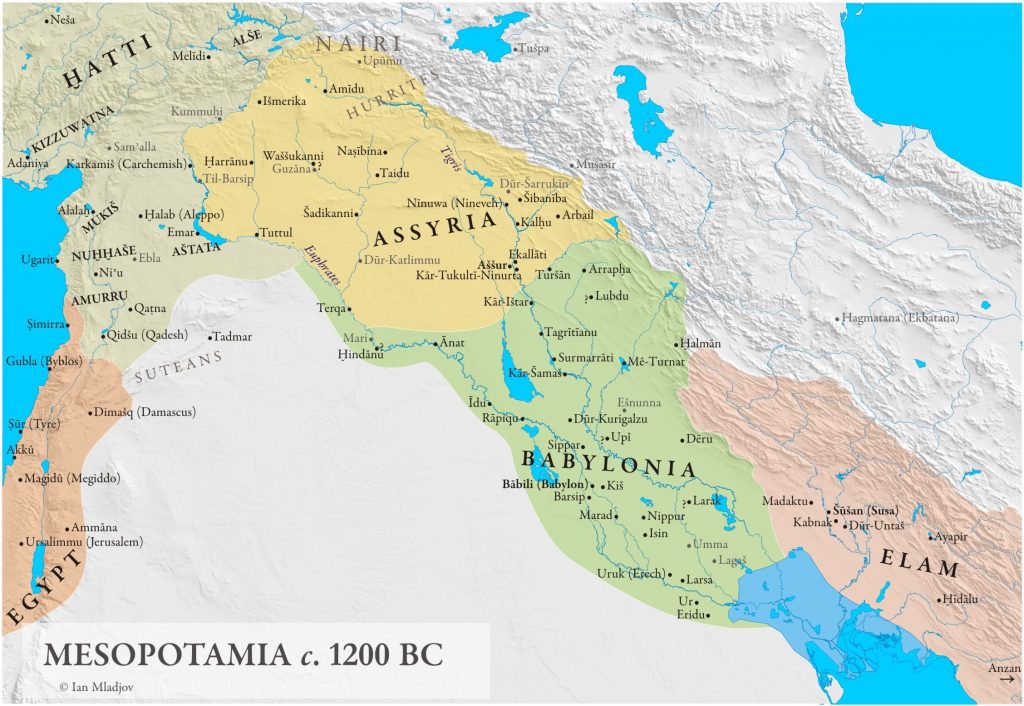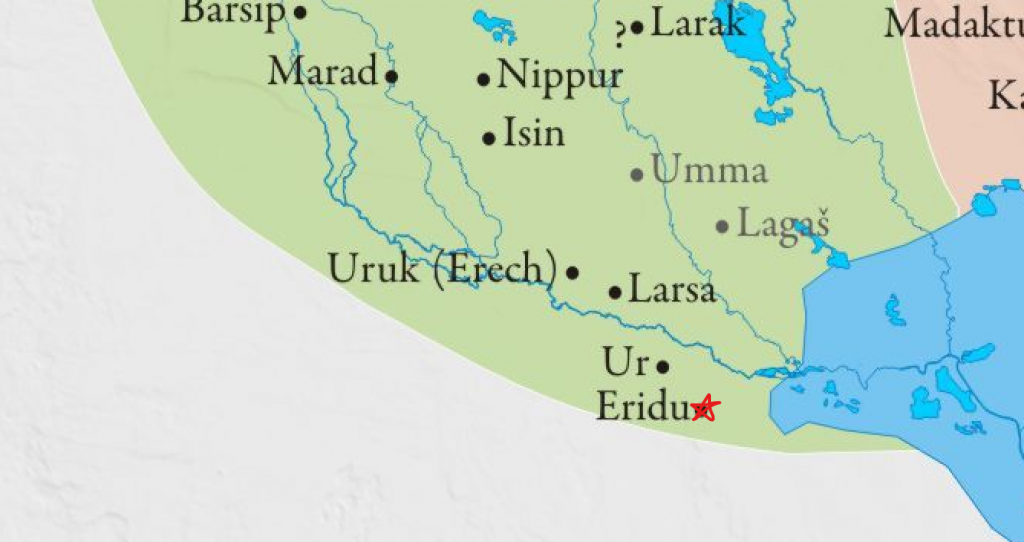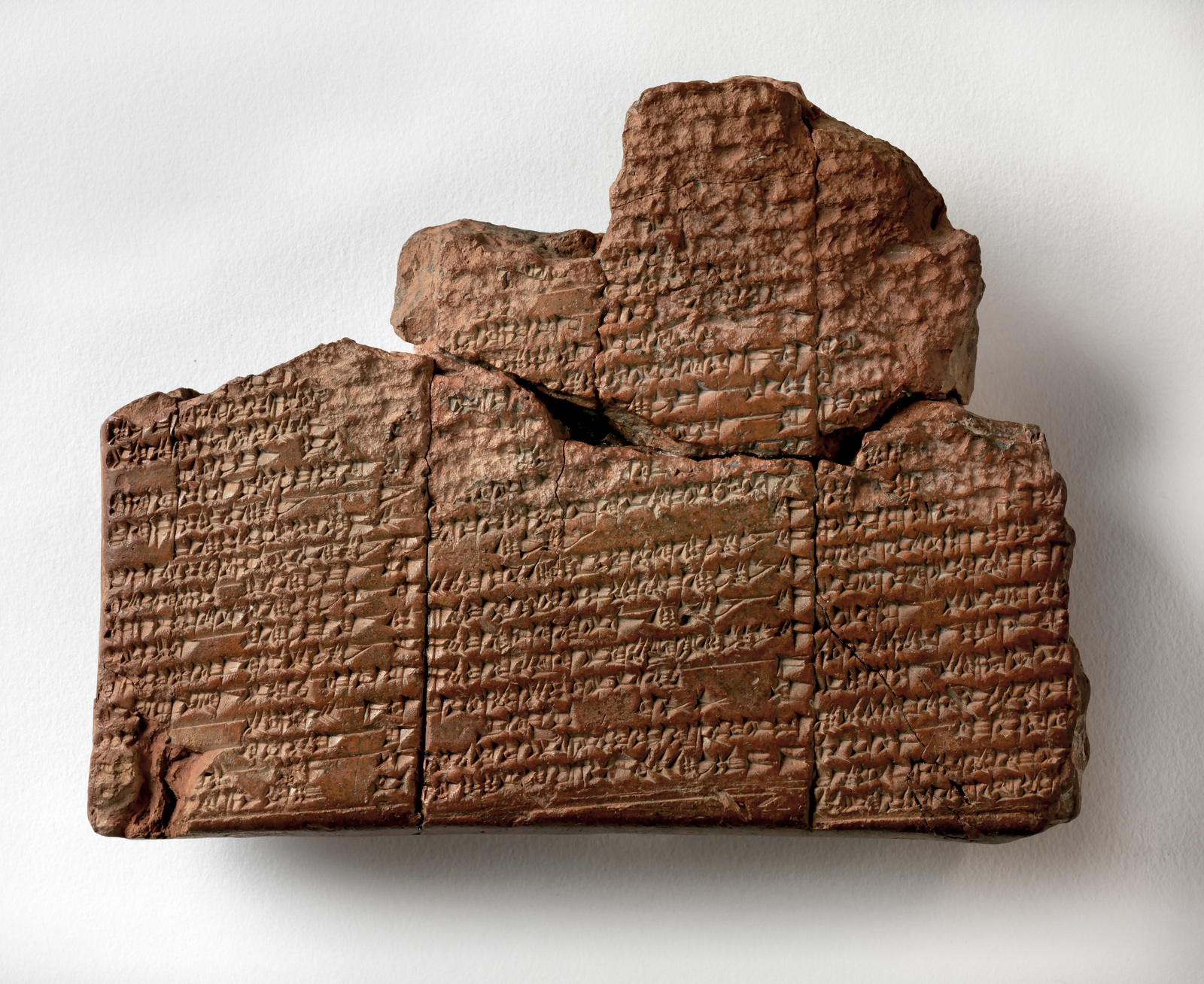About the Eridu Genesis Creation Myth
Dating
The Eridu Genesis myth comes from Old Babylonian empire and is usually dated to about 1600 BCE. It was written on clay tablets which are quite fragmented. It is often refereed to as the Sumerian Flood Myth. This is because it’s recorded in Sumerian cuneiform. However, paleographers would refer to it as Old Babylonian or Akkadian cuneiform script. The cuneiform script was widely used among most cultures in the ancient near east, however, it evolved quite a bit throughout history.

Despite being recorded in the late Old Babylonian period, the story it quite ancient. It has some parallels with the Epic of Gilgamesh but the Gilgamesh epic tablets are some 500-600 years later than the Eridu Genesis tablets. Like the Eridu Genesis story, the Epic of Gilgamesh is also much older than the tablets that contain the story.
The tale of Gilgamesh is really about the meaning of life and human mortality which has it’s stage set by the flood. Gilgamesh is searching for an answer to human immortality but in the end resides himself to the fact that all humans are mortal and that we must use our time here wisely. Eridu Genesis on the other hand is an explanation of creation and the order of things. Ziusudra, the main character survives 7 days and nights of flooding, not 40, and he is rewarded at the end with the eternal life and breath of the gods. The story is not as much an epic, like that of Gilgamesh, as it is a theological description of creation. This is why it’s often compared to the biblical Genesis, rather than the Epic of Gilgamesh.
In the Eridu Genesis, mankind is destroyed because of the behavior of human beings which appear to be a bother to the gods who created them. The original intention was to create humans that could work and toil in place of the gods but these humans were just annoying them. This is all-together different than the explanation of the biblical story as well as the Epic of Gilgamesh; both describing the flood as a result of humanities sinfulness.
The main differences between the biblical Genesis and the Eridu Genesis was the purpose of mankind. Anyone reading the biblical Genesis cannot help but to notice the elevation of mankind as a special creation who was meant to be in companionship with the creator. In the Eridu Genesis, as well as other ancient Near Eastern mythologies, mankind is created specifically to serve the gods or to provide some form of benefit to them.
Setting of the Myth in Eridu
Eridu is one of the oldest cities in Mesopotamia. Sumerian culture believed that Eridu was the very first civilization and that it was the location where the gods decided to create mankind. It is not hard to understand why the city was so successful over history, as they lay at the edge of the Persian gulf, surrounded by rivers and tributaries. No doubt the land was hospitable and plenty. Like the Egyptians, they benefited from yearly river flooding that left the area rich with new soil and deposits for which to plant.
The biblical garden of Eden is said to have also been located between these two great rivers. In fact, according to the description in Genesis, one would be led to believe that Eden was directly located in Babylon, just north of Ur and Eridu.
A river watering the garden flowed from Eden; from there it was separated into four headwaters. 11 The name of the first is the Pishon; it winds through the entire land of Havilah, where there is gold. 12 (The gold of that land is good; aromatic resin and onyx are also there.)13 The name of the second river is the Gihon; it winds through the entire land of Cush. 14 The name of the third river is the Tigris; it runs along the east side of Ashur. And the fourth river is the Euphrates.
(Genesis 2:10-14)


It should be noted that while Genesis is one of the older biblical texts, the oldest known manuscripts are quite late. In fact, the Hebrew manuscripts found in the Dead Sea Scrolls contain one of the oldest fragments written in Paleo Hebrew, which was a pre-exilic script. This manuscript was probably copied in the 2nd century BCE, but records a tradition much older but likely influenced by Babylonian creation mythology.
Text of the Eridu Genesis Creation Myth
- Mother Goddess Pities the Nomad Existence of Man
- Nintur was paying attention:
- Let me bethink myself of my humankind,
- all forgotten as they are;
- and mindful of mine,
- Nintur’s creatures let me bring them back
- let me lead the people back from their trails.
- May they come and build cities and cult places,
- that I may cool myself in their shade;
- may they lay the bricks for the cult cities in pure spots
- and may they found places for divination in pure spots!
- She gave directions for purification and cries for clemency,
- the things that cool divine wrath,
- perfected the divine service and the august offices,
- said to the surrounding regions: “Let me institute peace there!”
- When An, Enlil, Enki and Ninhursaga
- fashioned the dark-headed people
- they had made the small animals that come up from out of the earth,
- come from the earth in abundance
- and had let there be, as it befits it, gazelles
- wild donkeys, and four-footed beasts in the desert.
- Mother Goddess Institutes Kingship
- …and let me have him advise;
- let me have him oversee their labor,
- and let him teach the nation to follow along
- unerringly like cattle!
- When the royal scepter was coming down from heaven,
- the august crown and the royal throne being already
- down from heaven,
- he (the king) regularly performed to perfection
- the august divine services and offices,
- laid the bricks of those cities in pure spots.
- They were named by name and allotted half-bushel baskets.
- First Cities
- The firstling of those cities, Eridu,
- she gave to the leader Nudimmud,
- the second, Bad-Tibira, she gave to the prince and the sacred one,
- the third, Larak, she gave to Pabilsag,
- the fourth, Sippar, she gave to the gallant Utu.
- The fifth, Shuruppak, she gave to Ansud.
- These cities, which had been named by names,
- and had been allotted half-bushel baskets,
- dredged the canals, which were blocked with purplish
- wind-borne clay, and they carried water.
- Their cleaning of the smaller canals
- established abundant growth.
[lost account of the antediluvian rulers, and how human noise vexed the chief god Enlil so much that he persuaded the divine assembly to vote the destruction of man by the deluge] …
- That day Nintur wept over her creatures
- and holy Inanna was full of grief over their people;
- but Enki took counsel with his own heart.
- An, Enlil, Enki, and Ninhursaga
- had the gods of heaven and earth swear
- by the names of An and Enlil.
- Ziusudra’s Vision of the Gods Assembling
- At that time, Ziusudra was king
- and lustration priest.
- He fashioned, being a seer, the god of giddiness
- and stood in awe beside it, wording his wishes humbly.
- As he stood there regularly day after day
- something that was not a dream was appearing:
- conversation,
- a swearing of oaths by heaven and earth,
- a touching of throats,
- and the gods bringing their thwarts up to Kiur.
- Enki’s Advice
- And as Ziusudra stood there beside it, he went on hearing:
- Step up to the wall to my left and listen!
- Let me speak a word to you at the wall
- and may you grasp what I say,
- may you heed my advice!
- By our hand a flood will sweep over
- the cities of the half-bushel baskets, and the country;
- the decision, that mankind is to be destroyed
- has been made.
- A verdict, a command of the assembly cannot be revoked,
- an order of An and Enlil is not known
- ever to have been countermanded,
- their kingship, their term, has been uprooted
- they must bethink themselves of that.
- Now…
- What I have to say to you…
- …
- [lost account of Enki’s advice to build a boat and load it with pairs of living things, and Ziusudra’s compliance]
- The Deluge
- All the evil winds, all stormy winds gathered into one
- and with them, then, the flood was sweeping over the cities of
- the half-bushel baskets
- for seven days and seven nights.
- After the flood had swept over the country,
- after the evil wind had tossed the big boat
- about on the great waters,
- the sun came out spreading light
- over heaven and earth.
- Ziusudra’s Offering at End of Flood
- Ziusudra then drilled an opening in the big boat.
- And the gallant Utu sent his light
- into the interior of the big boat.
- Ziusudra, being king,
- stepped up before Utu kissing the ground
- before him.
- The king was butchering oxen,
- was being lavish with the sheep
- Barley cakes, crescents together with…
- …he was crumbling for him
- juniper, the pure plant of the
- mountains, he filled on the fire
- and with a …clasped to
- the breast he…
[lost account of Enlil’s wrath at finding survivor’s and his mollification by Enki]
- End of Enki’s Speech
- You here have sworn
- by the life’s breath of heaven
- the life’s breath of earth
- that he verily is allied with yourself;
- you there, An and Enlil,
- have sworn by the life’s breath of heaven,
- the life’s breath of earth.
- that he is allied with all of you.
- He will disembark the small animals
- that come up from the earth!
- Ziusudra Rewarded
- Ziusudra, being king,
- stepped up before An and Enlil
- kissing the ground.
- And An and Enlil after honoring him
- were granting him life like a god’s,
- were making lasting breath of life, like a god’s,
- descend into him.
- That day they made Ziusudra,
- preserver, as king, of the name of the small
- animals and the seed of mankind,
- live toward the east over the mountains
- in mount Dilmun.
References and further reading
http://www.piney.com/EriduGen.html
https://www.ancient.eu/sumer/
https://www.ancient.eu/eridu/
https://www.thoughtco.com/eridu-iraq-earliest-city-in-mesopotamia-170802
